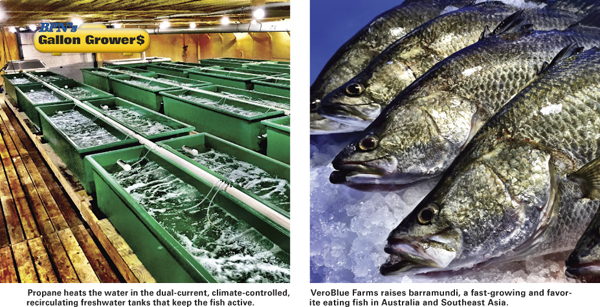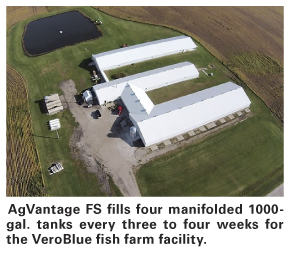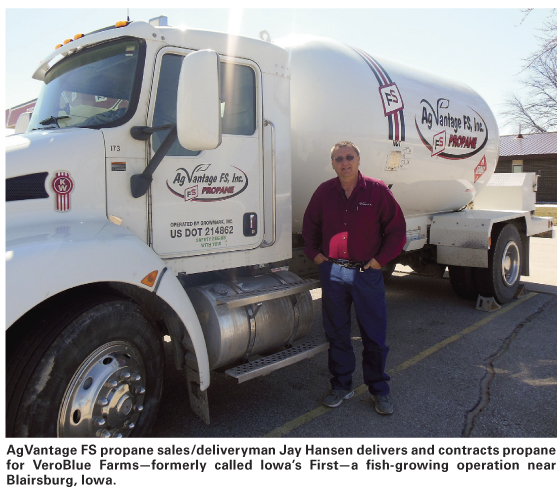Monday, March 20, 2017
By Connie M. Smith … In these times of declining gallons, dealers are constantly looking for new ways to increase sales and add new burner tips. Sometimes that takes thinking outside the box—way outside the box in this case. Growing fish in the middle of a field in the heartland of America is certainly not the average agricultural use, but in this case, it certainly has grown gallons sold. 
Jay Hansen never thought he’d be delivering propane to a fish farm. Since starting his propane career in 1989 with Ferrellgas, and becoming part of the AgVantage FS (Waverly, Iowa) sales/delivery team in 2007, Hansen had filled tanks for the typical corn dryers, hog buildings, farm homes, and businesses.
He also built relationships with his customers, including Jeff and Mark Nelson, cousins who managed a traditional Iowa crop and hog farm near Blairsburg. Hansen had been delivering to the Nelsons since the mid-1990s. When the Nelsons converted an older hog barn into a facility to raise fish they naturally turned to Hansen for the facility’s propane needs. Selling its first fish in 2012, it was the state’s first indoor recirculating system/aquaculture operation, which the Nelsons appropriately named “Iowa’s First.”
Today, AgVantage FS not only provides the propane to warm the building that houses the fish tanks and office, but also to warm the water in which the fish live. And the business is growing, just like the fish it raises. According to Mark’s daughter, Grace, once the Nelsons decided to expand the business they partnered with a group of like-minded business entrepreneurs focused on changing the seafood industry in the U.S.—creating a safe and dynamic domestic supply of fish rather than continuing to depend primarily on imports.
There are definite signs that the Nelsons’ desire to grow the industry is happening right in Iowa, including: an expansion of the Blairsburg facility; conversion of a former Webster City manufacturing building into another fish-raising site; and future plans to open a fish hatchery.
It’s hard to find a better promoter of this growing aquaculture business than the man who fills the Blairsburg facility’s four 1000-gal. propane tanks. “Eighty-five to 90% of the fish we eat in the U.S. comes from foreign countries,” says Hansen, who has become a local expert on the fish farm. “You feel a lot better eating their fish because you know where it comes from.”
While the Nelsons started out growing a hybrid striped bass, they’ve switched to barramundi, a favorite eating fish in Australia and Southeast Asia. The barramundi are hatched in Australia, and each week the Nelsons travel to Minneapolis to pick up thousands of the half-inch fingerlings.
The fingerlings are transported to the Nelson facility and grown in dual-current, climate-controlled, recirculating freshwater tanks that keep the fish active and swimming upstream. The system runs on air, is low-maintenance, and requires little energy. The fish grow very quickly in this system and are sold when they reach around 2 pounds.
Impressive Systems
“It’s unbelievable how it all works,” says Hansen, citing details about the efficiency of the opposing-flow water system in the tanks, how the water is cleaned and reused, and the computerized feeding of the fish.
Keeping the water temperature at the required 26°C-28°C (78.8ºF-82.4°F) is critical. Hansen fills the four manifolded propane tanks positioned in front of the Blairsburg facility every three to four weeks, depending on the weather; a second AgVantage driver fills the tanks at another fish-growing site in Buckeye, Iowa. Hansen, however, is responsible for working directly with the Nelsons to contract propane for both facilities.
Aquaculture: A Propane Opportunity
During 2016, the two fish farms contracted a combined 60,000 gallons; for 2017, 100,000 gallons have been contracted. The year-round propane demand provides a nice addition to sales for both Hansen and AgVantage FS. “The last several years the demand for propane for corn drying has been down, and home heating sales last winter were down—so the fish farm gives us a different opportunity,” says Hansen. The possibility of a growing aquaculture business in Iowa could mean additional year-round sales for other propane marketers, as well.
AgVantage FS’s area energy manager, Doug Dall, agrees, but says with the boost in sales comes an increase in responsibility. “It’s a steady-gallon customer and we’ve got to be on our game,” he commented. “They’ve got a lot of dollars tied up in this venture and they’ve got to maintain certain temperatures for the fish. We’ve got to make sure those propane tanks are full.”
To assist Jay in that quest, the co-op invested in tank monitors that transmit tank level readings to Hansen’s and Dall’s laptops and to the co-op’s main office. The monitors ensure that VeroBlue Farms has an adequate supply of propane, and helps Hansen eliminate unnecessary trips to check on their supply.
Dall highlighted Hansen and VeroBlue Farms’ account at a kickoff meeting of his AgVantage FS propane drivers/sales team last year. “I asked Jay to speak to his peers,” says Dall. “I wanted them to see there are other opportunities out there besides home and corn dryers…I wanted to highlight Jay — what he’s done and his success.”
That success is due, no doubt, to the cost-effective benefits of propane. But it also has a lot to do with the Nelsons’ comfort level with the individual who delivers that propane. Dall explains that customers can’t differentiate the propane product between marketers, but they can compare service, safety, and the ability to build a solid and trustworthy relationship. “To be able to trust your delivery person like they trust Jay is huge,” says Dall. “He’s earned their loyalty over the years, and AgVantage FS has that account because of what Jay brought to it. We take a lot of pride in taking care of that account.”
Worry-Free Service
Hansen has a personal pride in the VeroBlue Farms’ account, as well. “The Nelsons are very good people to work with,” he says. “I’ve dealt with them over the years and I know how their operation runs. They don’t have to worry about anything when it comes to their propane needs.”
(This article originally appeared in the November 2016 issue of the Iowa Propane Gas News)

Jay Hansen never thought he’d be delivering propane to a fish farm. Since starting his propane career in 1989 with Ferrellgas, and becoming part of the AgVantage FS (Waverly, Iowa) sales/delivery team in 2007, Hansen had filled tanks for the typical corn dryers, hog buildings, farm homes, and businesses.
He also built relationships with his customers, including Jeff and Mark Nelson, cousins who managed a traditional Iowa crop and hog farm near Blairsburg. Hansen had been delivering to the Nelsons since the mid-1990s. When the Nelsons converted an older hog barn into a facility to raise fish they naturally turned to Hansen for the facility’s propane needs. Selling its first fish in 2012, it was the state’s first indoor recirculating system/aquaculture operation, which the Nelsons appropriately named “Iowa’s First.”
Today, AgVantage FS not only provides the propane to warm the building that houses the fish tanks and office, but also to warm the water in which the fish live. And the business is growing, just like the fish it raises. According to Mark’s daughter, Grace, once the Nelsons decided to expand the business they partnered with a group of like-minded business entrepreneurs focused on changing the seafood industry in the U.S.—creating a safe and dynamic domestic supply of fish rather than continuing to depend primarily on imports.

There are definite signs that the Nelsons’ desire to grow the industry is happening right in Iowa, including: an expansion of the Blairsburg facility; conversion of a former Webster City manufacturing building into another fish-raising site; and future plans to open a fish hatchery.
It’s hard to find a better promoter of this growing aquaculture business than the man who fills the Blairsburg facility’s four 1000-gal. propane tanks. “Eighty-five to 90% of the fish we eat in the U.S. comes from foreign countries,” says Hansen, who has become a local expert on the fish farm. “You feel a lot better eating their fish because you know where it comes from.”
While the Nelsons started out growing a hybrid striped bass, they’ve switched to barramundi, a favorite eating fish in Australia and Southeast Asia. The barramundi are hatched in Australia, and each week the Nelsons travel to Minneapolis to pick up thousands of the half-inch fingerlings.
The fingerlings are transported to the Nelson facility and grown in dual-current, climate-controlled, recirculating freshwater tanks that keep the fish active and swimming upstream. The system runs on air, is low-maintenance, and requires little energy. The fish grow very quickly in this system and are sold when they reach around 2 pounds.

Impressive Systems
“It’s unbelievable how it all works,” says Hansen, citing details about the efficiency of the opposing-flow water system in the tanks, how the water is cleaned and reused, and the computerized feeding of the fish.
Keeping the water temperature at the required 26°C-28°C (78.8ºF-82.4°F) is critical. Hansen fills the four manifolded propane tanks positioned in front of the Blairsburg facility every three to four weeks, depending on the weather; a second AgVantage driver fills the tanks at another fish-growing site in Buckeye, Iowa. Hansen, however, is responsible for working directly with the Nelsons to contract propane for both facilities.
Aquaculture: A Propane Opportunity
During 2016, the two fish farms contracted a combined 60,000 gallons; for 2017, 100,000 gallons have been contracted. The year-round propane demand provides a nice addition to sales for both Hansen and AgVantage FS. “The last several years the demand for propane for corn drying has been down, and home heating sales last winter were down—so the fish farm gives us a different opportunity,” says Hansen. The possibility of a growing aquaculture business in Iowa could mean additional year-round sales for other propane marketers, as well.
AgVantage FS’s area energy manager, Doug Dall, agrees, but says with the boost in sales comes an increase in responsibility. “It’s a steady-gallon customer and we’ve got to be on our game,” he commented. “They’ve got a lot of dollars tied up in this venture and they’ve got to maintain certain temperatures for the fish. We’ve got to make sure those propane tanks are full.”
To assist Jay in that quest, the co-op invested in tank monitors that transmit tank level readings to Hansen’s and Dall’s laptops and to the co-op’s main office. The monitors ensure that VeroBlue Farms has an adequate supply of propane, and helps Hansen eliminate unnecessary trips to check on their supply.
Dall highlighted Hansen and VeroBlue Farms’ account at a kickoff meeting of his AgVantage FS propane drivers/sales team last year. “I asked Jay to speak to his peers,” says Dall. “I wanted them to see there are other opportunities out there besides home and corn dryers…I wanted to highlight Jay — what he’s done and his success.”
That success is due, no doubt, to the cost-effective benefits of propane. But it also has a lot to do with the Nelsons’ comfort level with the individual who delivers that propane. Dall explains that customers can’t differentiate the propane product between marketers, but they can compare service, safety, and the ability to build a solid and trustworthy relationship. “To be able to trust your delivery person like they trust Jay is huge,” says Dall. “He’s earned their loyalty over the years, and AgVantage FS has that account because of what Jay brought to it. We take a lot of pride in taking care of that account.”
Worry-Free Service
Hansen has a personal pride in the VeroBlue Farms’ account, as well. “The Nelsons are very good people to work with,” he says. “I’ve dealt with them over the years and I know how their operation runs. They don’t have to worry about anything when it comes to their propane needs.”
(This article originally appeared in the November 2016 issue of the Iowa Propane Gas News)

